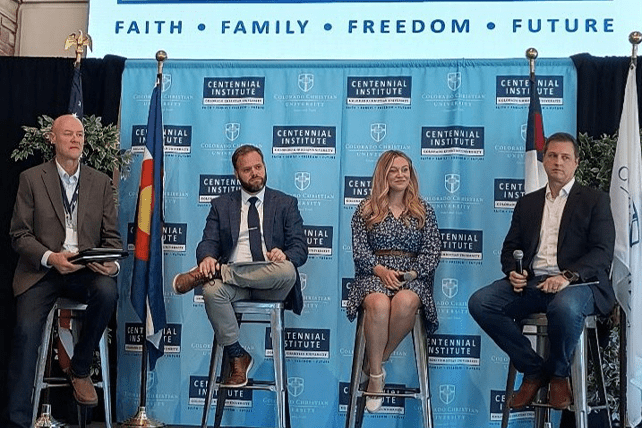Tim Estes: Christians Must Steward AI Wisely
AI pioneer Tim Estes, who founded Digital Reasoning and now leads AngelQ, said artificial intelligence is “a new kind of mind” and probably humanity’s “final invention,” so people must steward it well. AI is a mirror as well as a tool, he said, and what it reflects can be “unsettling.”
Speaking on a panel titled “Artificial Intelligence and Influence: Finding the Ethical Balance in a Tech-Driven World,” Estes cited AI’s vast potential to find medical cures, answer questions about space, and more. But he also pointed to the technology’s darker side, calling it a “digital narcotic that fosters false relationships, uses the deepest human needs to create dependency, and erodes our capacity for stillness and time with our Creator.”
Because human beings aren’t biological machines or data points, Estes said, the philosophy of AI builders is key. “Technology built by human hands must serve us and help people thrive, not violate its creative purpose,” he warned. Referencing a concept from John Wesley, Estes said faith isn’t a private affair; therefore, AI should be more than just an engine for self-love.
Drawing from C.S. Lewis, Estes referred to ill-intentioned “conditioners” who try to co-opt, monetize, and control AI technology. “They promise endless satisfaction and a world without spirit,” Estes said, “because they believe there isn’t one.” When humans are reduced to their digital selves, they’re unable to be present or connect, Estes warned. “There cannot be virtue if there’s no source of human dignity.”
As for solutions, Estes urged Christians to be “defenders of the human heart,” both in private and in public. He challenged followers of Jesus to engage with culture and push back against the rhetoric that technological innovations are always positive.
Christians also should demand justice and accountability when tech companies cause harm, Estes noted. “Say their names,” he said, referring to children who are dead because AI chatbots coached them to kill themselves.
AI must be redesigned with a “duty of loyalty” so it serves the best interests of users, Estes said. And humans must remain disciplined, spending time in Jesus’ presence and serving God and others.
During a Q&A session, the panelists answered questions about living in an AI world. People will have to pick their battles and draw lines, they advised, because avoiding all AI will soon be difficult.
Regarding AI’s effects on the job market, panelists said workers will need to lean into what makes them distinctly human and irreplaceable. Interactive careers such as ministry and teaching will face fewer AI-related threats, they said, because people still need human presence. And as AI turns most people into mid-level experts on most subjects, employees will need to pinpoint a passion and dive deeper into that area.

